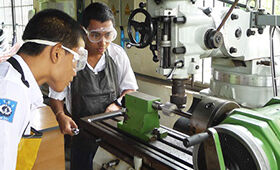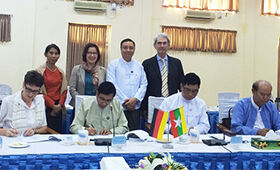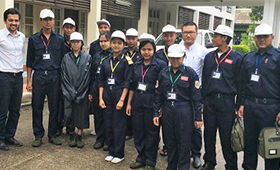Myanmar and Germany prepare the next phase of development cooperation in TVET
For developing its TVET system, Myanmar is working closely together with Germany. Currently, the ongoing Technical Cooperation, implemented by GIZ, is being evaluated and a new project prepared – with contribution of GOVET.

Since the opening up of the country in 2012, Myanmar’s economy has grown rapidly. For further growth, the major bottleneck emerging is skilled labor. At the same time, Myanmar has a young population with many people dropping out of school and little access to formal vocational training. Big challenges for any TVET system, but even more so in Myanmar, where the TVET system is only in the early stages of development. In fact, the current system requires higher demand-orientation and much more people enrolling. The government of Myanmar accordingly puts high priority on TVET sector reform and development. Key development partner: Germany. This was again confirmed during the recent meeting between Myanmar Minister of Foreign Affairs Aung San Suu Kyi and Federal Minister Dr. Gerd Müller (BMZ) in Nay Pyi Taw, Myanmar.

Germany reentered development cooperation with Myanmar in 2012, along with other development partners. One of the priority areas supported by the German Federal Ministry for Economic Cooperation and Development (BMZ) is Sustainable Economic Development, of which TVET is one pillar. Support consists of Technical (TC) as well as Financial Cooperation (FC), implemented on the German side by GIZ and KfW respectively. Political partners are the Myanmar Ministries of Industry (MOI), Labour (MOLIP) and Education (MOE). The bilateral Technical Cooperation Programme “Promotion of TVET in Myanmar” has the objective to make TVET in Myanmar more demand-oriented. This includes capacity building of stakeholders at all levels of the TVET system – policy makers, regulatory bodies, TVET institutions, associations and employers. Programme support furthermore covers the entire “value chain” of TVET - from developing the policy framework and TVET standards, to implementation and finally assessment. Key topics of support are TVET personnel, recognized standards, cooperation between government and business – also reflecting and utilizing experiences of German vocational training.

With the current phase of support ending this year (2016), an evaluation and appraisal mission was conducted by TVET experts from 30th of May to 18th of June 2016 on behalf of GIZ. GOVET contributed with expertise to this mission. The mission has evidence, that the TVET programme had produced significant results. Teachers were better qualified to train, TVET graduates successfully found employment at companies, occupational standards were developed, policies included concepts for more demand-oriented TVET. At the same time, it became clear that in order for these results to multiply and shape the TVET system for years to come, further capacity development would be crucial. Recommendations for the possible future design of the TVET programme were accordingly developed and discussed with partners. The results of the mission will form the conceptual basis for the new phase of the TVET programme. Whatever shape this phase may take, TVET cooperation between Myanmar and Germany is on track.